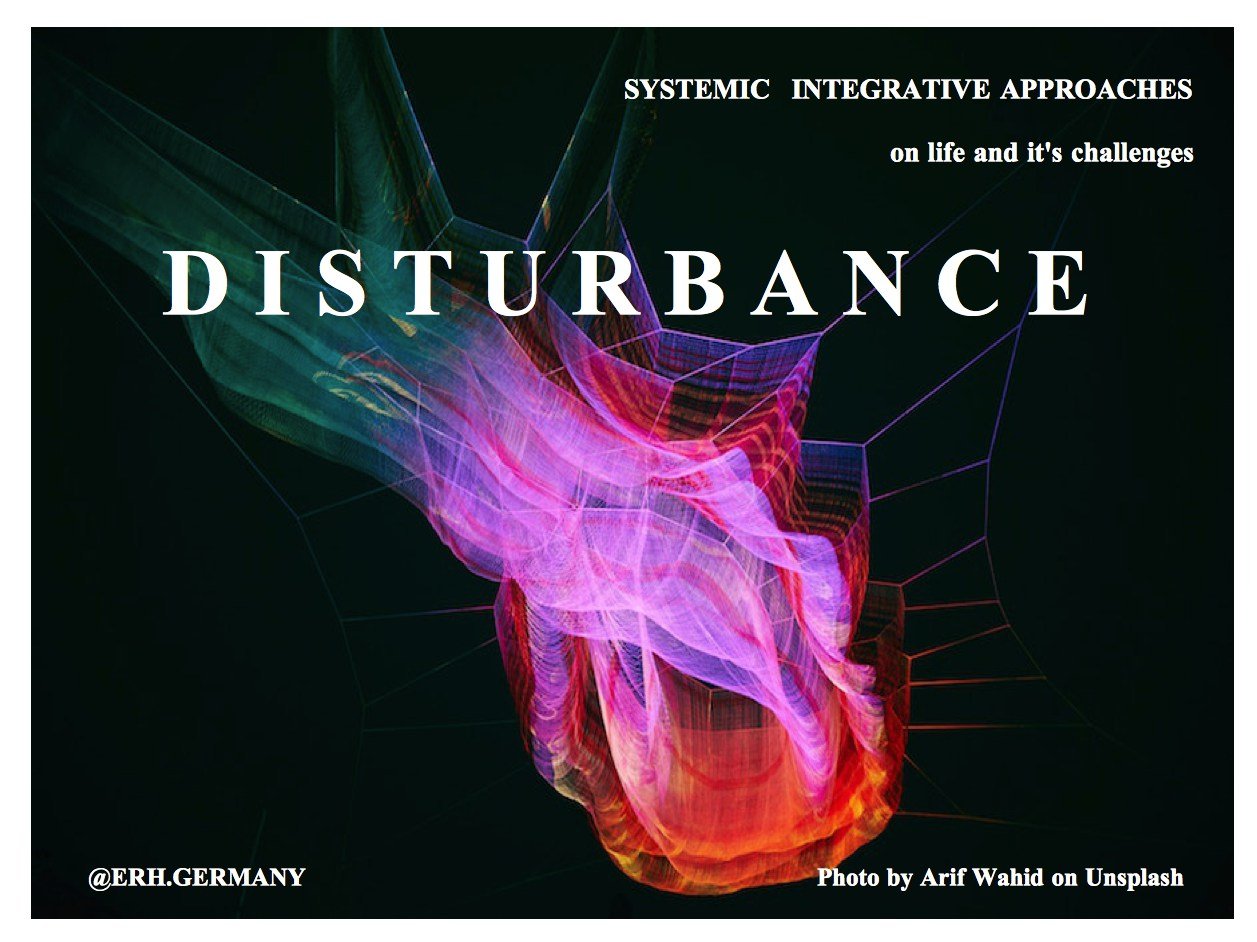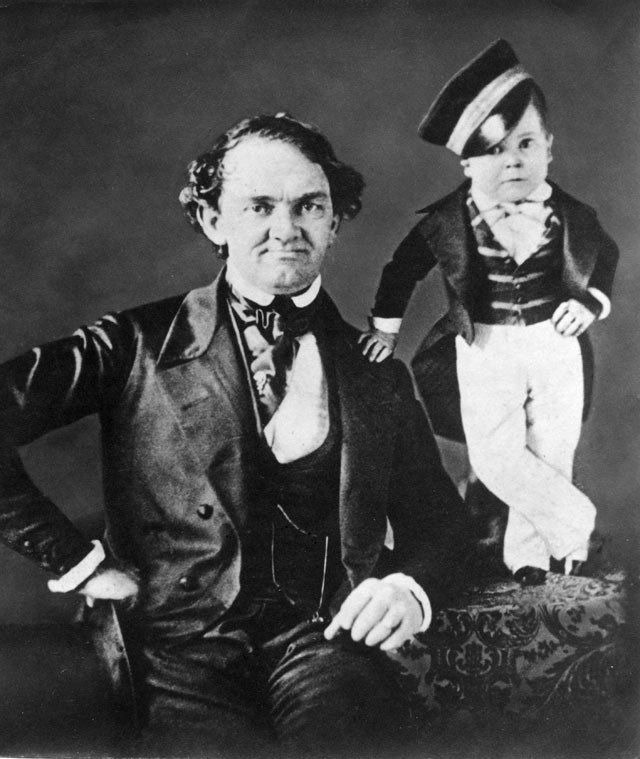
Today I want to dig into nuisances and what good you can make out of them. As always I use the systemic mindset while I investigate the topic. If you haven't heard of the term "systemic" you can go to those articles of mine which are tagged with "steemstem", there you find some explanations and links (also in the footnotes).
The image and role of „disturbances“
When you think about the concept of disorder, what comes to mind spontaneously?
Generally speaking, we understand the word as something negative. Something to kill our nerves.
But if you look at the disturbance in a neutral way, it has a very useful function. I want to layout this to you in more depth and I will first talk in a light way before I will get to the point in a psychological manner.
What is given the name of disturbance?
A disturbance shakes up something, disturbs the familiar and the routine, it draws attention to something that needs to be changed or observed.
In advertising, we speak of "disturbers" (Störer) in order to attract special attention; at least with us in Germany.
In medicine, a disorder is either organic or mental. If an inner organ wouldn't bother us that it hurts, we might continue to eat things that make us sick. If the behaviour of a mental disorder would not draw attention to itself in the form of grief, we would be less concerned about each other or ourselves.
Of course, the disturbance has a hard time feeling welcome.
In most cases, it has to be content with only receiving a certain amount of recognition afterwards - once it's task has been fulfilled.
Then you can of course also disturb the "rest of the dead" or even the „silence“ itself. The latter is a common phenomenon in large cities, the former concerns modernity as well as prehistory, for example, when people think that organ transplants disturb the rest of the (not yet) dead and if graves are subsequently altered and this annoys archaeologists.
We also know radio interference, which is actually an electromagnetic interference that emits, radiates or induces an unwanted energy on the reception of radios. The noise or crackling makes the news or music broadcast obscure.
We know the disturbances on the spaceship Enterprise, where all nose long a disturbance occurs, if once again the ensign makes an "interference" responsible for it, if the sensors cannot work properly and the data are falsified.
We call a physical disorder of the human body "dysfunction" because we do not like to suffer headaches or other pains or limitations.
Our psyche seems to be most disturbed, the catalogue of mental disorders is better not to look at it closely, because then one would think the world is full of lunatics. I will come back to this later on.
We feel disturbed by the Trolls & Spammers who boast the social networks with their ominous comments and messages.
Disorder in a family - the troublemakers

Within a social system - a family, for example - the troublemakers take on an important task. They don't let the other family members get too comfortable. The troublemaker in the family has therefore taken on a quite thankless task. He attracts negative attention. However, since in a family system everyone interacts with each other, one person calls for passivity of the other's activity.
We are constantly trying to balance each other out.
We're interrupting.
For example, when one speaks of high-flying ideas and risky business manoeuvres, the other tends to warn, to react sceptically to the ideas and to question them.
Both can disrupt the role of the sceptic as well as the visionary. One is annoyed by the other perspective, because the need for unreserved confirmation is valued more highly. Only: if everyone always talks after the mouth, it bothers you too.
However, if a family member has been silent, even though he had some fears about a decision or action of his brother, the other does not thank him afterwards.
Children disturb their parents
... with uncooperative behaviour [1] when they feel that their parents do not understand or do not love each other. By attracting attention, they want (unconsciously) to make the parents "common" and take good care of the child.
Children have the annoying urge to put things right.
Parent relationships that are on a good footing usually have children who do not need to draw much attention to themselves. They can achieve a healthy feeling of self-esteem.
But there's a trap built into it.
Children who do not draw attention to themselves at all, who do not force any difficult arguments with their parents, who seem to run along with them in everything adapted and without any problems, then show too much consideration for their parents, if not everything is in order with them.

In this way, it would be good for such a child to become conspicuous with an annoying disorder so that it can be seen again.
- Then we are bothered by people who smack, burp, fart and whistle or hum. Those who wrap their hair around their fingers, pop their noses, snap their fingers or roll small pieces of paper.
This gives us a variant of disturbance, which tells us about the feeling of well-being or a little tick of the others, but which we just can't stand. A little more gratitude would do no harm here too. We're jealous. Exactly to the extent that we prohibit ourselves from smacking, belching and farting or embarrass our ticks.
And all this is supposed to be "good" now?
Yes.
Without all these disturbances and annoying things, we wouldn't know who we are. We would suffer a small or large loss of identity if we were exempted. An existence in which always „Eitel Sonnenschein“ (always sunshine) prevails is simply impossible.
Unfortunately, we are sometimes so sweet washed to actually want to produce this and to get rid of all the annoying things. The stupid thing is, the more we want to do this, the less it works. With the troublemakers, it's like the Hydra. If you knock one of them's heads off, twice as many new ones will grow back. If someone has ever bothered you while you were talking and you have forbidden them to speak: what trouble did it give, didn't it? If you'd hit a "mute" button on all of them, then what?
Yeah, right. You would be so bothered by the sounding silence around you!
Even the machines that experience malfunctions would not be further developed if they were all running like clockwork, no technical system would be improved if it didn't get mucky. I am exaggerating, of course, but otherwise it is not clear what I intend to do.
I'm writing a tribute to the disturbance.
It should be lived up to the highest standards and at the same time receive what it deserves: that it should be thanked. It ensures that you get moving, take care of disturbed children, adults, machines, sensors, networks and gravesites.

Not even the pathologies should just stand still for themselves.
Because what is pathological also has an opposite side at the same time, namely salutogenesis. The pathological, i. e. the disturbing, sick person could not be defined if there were not the undisturbed and healthy. But if you only consider the whole thing unwelcome, then something terrible happens: you concentrate exclusively on what doesn't work. Therefore, always consider a disturbance as a little helper.
Good disturbances - Surprise, Whoopsie!
You wouldn't wish a pleasant disturbance to hell, would you? Like when you get a phone call telling you about a million-dollar legacy. Or your son or daughter barging in at the door and screaming that they have won first place in the competition. Even a humorous kind of disturbance would delight you if, for example, the ring falls between the pews of the church and the wedding ceremony becomes an unforgettable event.
You wouldn't necessarily report it as a "disturbance" or think about it in this way, but that's exactly what it is. A malfunction is nothing more than an interruption of our accustomed comfort.
Bad disturbances - Shut the ... up!
Of course, unpleasant disturbances at the moment of emergence are by no means delightful. We become angry, sad or insecure - mostly all together. If someone else interferes with our behaviour or "stirs us up" we cannot always take it calmly. But once the first disturbance has subsided, we can do something about it: we follow up on the hint of the disturbance and find out the actual cause. For example, in a relationship. When the disturbing behaviour of the one in the form of unspoken but clearly noticeable dissatisfaction expresses itself in verbal peaks or impatience.
What we can do is describe our observation to the other person. We better not be upset, reproachful or angry about this. Making it clear to someone that they are behaving in a disturbing way over a longer period of time is a high art. It is THE ultimate art of interpersonal relationships.
Self disturbances - "I am worthless. My friend is bad. The world sucks."
Now I come to the last and probably most uncomfortable aspect of "disturbance". I mean, when you disturb yourself. From my point of view, this is probably the most important thing in the world and it has the greatest influence on how we move within social circumstances.
I would like to refer to two distinctions:
- The "I-disturbance", triggered by our own thoughts and feelings and
- the comfort disturbance, whose triggering reactions in us are attributed to others.
Quote: „Ego disturbance represents an upset to the self-image. It results from holding demands about one’s ‘self’, e.g. ‘I must … do well / not fail / get approval from others“ and „Discomfort disturbance results from demands about others (e.g. ‘People must treat me right’) and about the world (e.g. ‘The circumstances under which I live must be the way I want’).“ [3]
Deal elegantly with disturbances if you can
The systemic approach of looking at the challenges of life and its tasks offers an unusual perspective to each of the aspects studied. Thus, "problems" are not something bad, just as "disturbances" or "pathologies" are not judged to be exclusively negative. Instead, any movement in a system is checked for its useful value.
Some aspects of systemic counseling practice are, for example, social interactions in which disturbances occur, such as the "reproach" of one person addressed to another person in the system. Systemic counseling has borrowed its methods and findings to a high degree from psychology, where it makes use of therapies that have been accepted as successful. The practitioners refer, for example, to the field of "positive psychotherapy". [4]
Quote: "Positive Psychotherapy (PPT) is a psychotherapeutic method developed by Nossrat Peseschkian and colleagues in Germany since 1968. It can be described as humanistic psychodynamic psychotherapy based on a positive perception of human nature. PPT is an integrative method that includes humanistic, systemic, psychodynamic and CBT elements. Today, there are centers and training courses in around twenty countries worldwide. It should not be confused with positive psychology."
"disturbance" and its positive connotation. "No patience? then you are a man of energy!"
As I found a real good explanation and examples to this, I quote again from the website:
"The three main principles or pillars of positive psychotherapy are:
- The Principle of Hope
- The Principle of Balance
- The Principle of Consultation
The Principle of Hope implies that the therapist wants to assist their patients to understand and see the meaning und purpose of their disorder or conflict. Accordingly, the disorder will be reinterpreted in a "positive" way (positive interpretations):
Some examples:
- Sleep disturbance is the ability to be watchful and get by with little sleep
- Depression is the ability to react with deepest emotionality to conflicts
- Schizophrenia is the ability to live in two worlds at the same time or living in a fantasy world
- Anorexia nervosa is the ability to get along with few meals and identify with the hunger of the world"
I had never read or heard of such a view before I came into contact with the systemic approach. It still seems to be brand-new, even though this approach has been present in Europe for almost a hundred years. Although it is certainly much older when one considers the parallels with Buddhist teaching.

Unlike Peseschkian, who in his model refers to four areas and calls it "balance model", I personally work with the "five pillars of identity" [5] according to Hilarion Petzold. Peseschkian's model is very valuable, but in my opinion Petzold's theory is even more comprehensive and catchy.
This way of looking at things in life should not be limited to psychotherapy alone. And fortunately it doesn't. Systemic consulting has come a long way and extends to all sorts of areas, including organizational consulting in companies.
In my opinion, it is suitable for everyday use. As with everything that is trying to establish itself, it takes a lot of time, patience, knowledge and understanding.
Conclusion:
It's not the disorder that makes a person depressed or tired. It is rather when someone has the impression that they are isolated and nobody is interested in them. Worse than being disturbed is not to be disturbed at all.
Little Quiz
Finally, I have some minor problems for everyday life, which I will pass on to you as a quiz. How can these inconveniences be interpreted positively and what can we learn from them or experiment with? Please, connote every situation positively:
- The coffee machine breaks down in the morning
- You're unexpectedly stuck in traffic jams
- You want to bake a cake and you miss two eggs (the shops are closed)
- The bus will drive you off in front of your nose
I am interested in your answers, for there are myriads of possibilities. Or in any other thoughts and impressions or ideas you got from this post.
Thank you for reading!
[1]: uncooperative children: Hagen Winter & Partner, Germany: Misconduct of children can be divided into several phases. However, the systemic connotes every wrongdoing in its positive form.
1. attract attention (active: interrupting, fooling around, asking for things/passive: not doing tasks, expecting to be served) - positive aspect: desire for participation
2. power (active: anger, demands / passive: stubbornly refuse or delay the fulfilment of tasks) - positive: independence
3. revenge (active: being mean, using inappropriate and offensive expressions, devaluation / passive: hurtful gestures, unattainability) - positive: fairness
4. proof of incapacity (passive: the child gives up easily, does not even try out the tasks) - positive: competence
[2]: Christopher Peterson Ph.D. - (https://www.psychologytoday.com/blog/the-good-life/200805/what-is-positive-psychology-and-what-is-it-not)
[3]: Rational Emotive Behaviour Therapy by Wayne Froggatt - Page 2 "Two Types of Disturbance" https://de.scribd.com/document/4201731/Intro-Rebt
[4]: 5 Pillars of identity - according to Hilarion Petzold https://openi.nlm.nih.gov/detailedresult.php?img=PMC3649688_NRP2013-932381.001&req=4
Being a Nursing Home Resident: A Challenge to One's Identity from Maria Riedl, Franco Mantovan and Christa Them - Chapter 2 "Framework": https://www.ncbi.nlm.nih.gov/pmc/articles/PMC3649688/
German Website / English content: Internationale Akademie für Positive und Transkulturelle Psychotherapie | Prof. Peseschkian-Stiftung Link extern
Picture sources:
Clan: https://de.wikipedia.org/wiki/Hatfield-McCoy-Fehde
Father & son: google images (I lost the track of this picture but searched it under license free. Cannot find it & hope for the best.
Robot: https://en.wikipedia.org/wiki/Tin_Woodman
Script roll: 
Eve with the book of knowledge: pixabay
If this has met your taste and interest,
follow me: @erh.germany

